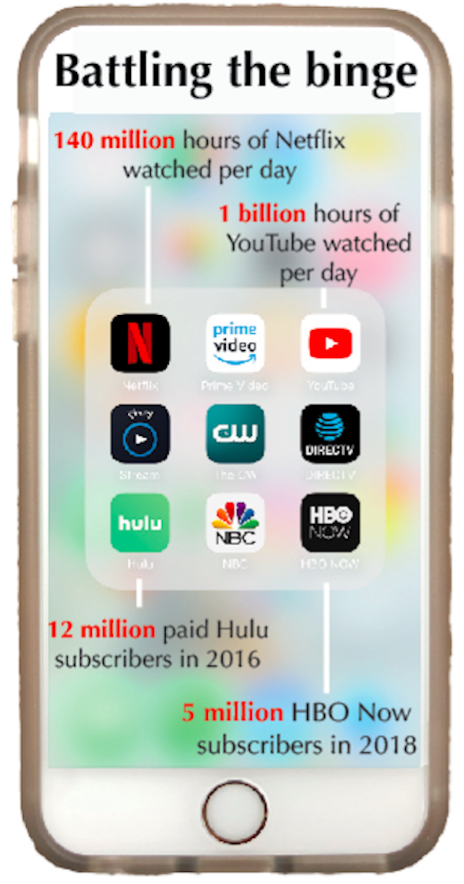Press pause
Binge watching prompts a lack of control.
Sources: Fox KTVU, Statistica, Omnicore Agency
May 28, 2018
With a monthly fee as low as $7.99 for both Netflix and Hulu subscriptions, binge watching one of the thousands of shows and movies available for streaming online has become part of many teens’ daily routines.
“For me, binge watching is a completely mindless activity and a good way to be alone and unwind,” sophomore Dena Silver, who says she frequently watches five to six episodes before bed, said. “It’s pretty easy to just keep watching, especially when I don’t know what time it is and Netflix will say ‘Start the next show.’ I really need to have self-control or else I fall down the rabbit hole of non-stop watching.”
Ninety percent of millennials binge watch, with 99 percent of them simultaneously engaging in other activities such as texting, surfing the web, online shopping, checking email or using social media networks, according to a Deloitte 2015 survey.
“Even though I know it’s not the best thing to do, I will sometimes do homework while I watch,” Silver said. “I also listen to music while I’m watching or eat snacks.”
While 73 percent of participants in a 2013 Netflix survey said they had positive feelings while binge-watching, extreme binging increases risk of health problems such as diabetes, cancer and heart disease due to the long amounts of immobility, according to the Journal of the American Heart Association.
“Binge watching impacts students because it is so easy to roll into the next episode and lose track of time,” school counselor Annie Egan said. “Watching the shows is an unhealthy and passive activity that actually detracts the brain from other activities it has to do.”
The average American watches approximately 2.7 hours of television a day, and 20 hours a week, according to the U.S. Bureau of Labor Statistics. Watching excessive amounts of television gets in the way of effective time management and productivity, according to Egan.
“Binge watching is a fun activity that passes time when I feel lazy or just want to laugh,” freshman Nadia Gibbons said. “Sometimes I’ll watch a little bit, do some work and then watch again. It gives me a sense of accomplishment when I finish a season, and get some work done too.”
Egan says she notices students using breaks in their class schedules such as free periods or lunch to both complete homework and catch up on their shows, which violates the school’s Acceptable Use Policy.
“Even when students think they can multitask, it has been proven to be ineffective since watching the shows actually makes it take longer to do the work,” Egan said. “Students will huddle around a computer screen with their notebooks out, but there is no possible way that they can be doing as good or as efficient of work if they were not watching.”
During extreme binges, individuals can become completely immersed in a show and emotionally attached to characters. When that specific show is over, it can feel similar to a withdrawal according to Egan.
“Usually I binge watch if I need to have an uplifting day because it takes me to this other place where it’s just me, the show and the characters,” sophomore Julianna Ovalle said. “I can just enjoy what’s happening on the screen and I don’t have to worry about anything else.”
Watching one or two episodes can be a good distraction or prescribed break from school, family or friends as long as it is done with self control, according to Egan.
“Just like with anything binge — like binge watching, binge drinking, binge eating — you lose control and intentionality,” Egan said. “Doing everything in moderation is definitely a healthier way to go.”










